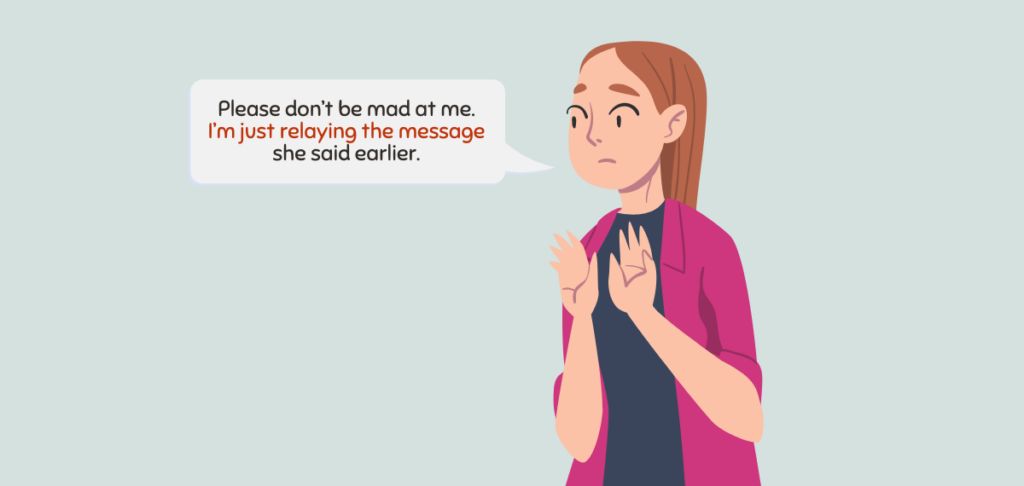Don’t shoot the messenger means the person delivering bad news is not to blame for the bad news itself. That responsibility rests with the originator of the message.
Idioms such as don’t shoot the messenger are phrases or expressions where the words together have a different meaning than their individual definitions. Using them can bring your prose to life, making your conversion more interesting and fun to listen to or read. Their use also demonstrates an advanced command of the English language.
This article delves into the idiom’s meaning, origin, and correct usage. It also provides sentence examples, related terms and phrases, and tips for effectively using the idiom. At the end, there’s a quick quiz to test your newly found knowledge. So, keep reading to learn more!

What Does the Idiom Don’t Shoot the Messenger Mean?
The idiom don’t shoot the messenger means don’t blame or punish the person delivering the message, especially if the news is unpleasant or not what you wanted to hear. It is often used when someone reveals a difficult truth they know the listener does not want to hear. However, the person bearing the news is not to blame for the message they are delivering.
According to the Cambridge Dictionary, the idiom is “said to warn someone not to be angry with the person who tells them something bad.” Similarly, the Collins Dictionary defines the idiom as “to unfairly blame a person who has given you bad news or information when you should instead be angry with the people who are responsible for the situation.”
I was recently tasked with telling a friend at the squash club that her dog had nipped another dog in the bar. The canine assault victim’s owner was very upset and looking for the owner of the attacker to remonstrate with her.
“No way!” My friend retorted when I delivered the news. “My Trixie would never do that!”
“Okay, calm down. Don’t shoot the messenger!” I replied.
Literal Meaning vs. Figurative Meaning
The idiom, don’t shoot the messenger, could literally mean to aim a firearm at the person delivering bad news and pull the trigger. However, thankfully, that rarely happens.
The phrase’s literal meaning is commonly used to create a picture of someone passing on bad news and being blamed for the message’s content, even though it is not their fault.
How Is Don’t Shoot the Messenger Commonly Used in Context?
The idiom don’t shoot the messenger is a timeless expression conveying the notion of refraining from blaming the bearer of bad news for the message they deliver. Often used in various situations to highlight the importance of separating the messenger from the message, this idiom holds valuable insights.
To explore its usage and nuances, the following sections provide a deeper understanding:
What Are the Different Ways to Use the Idiom Don’t Shoot the Messenger?
- Delivering bad news: “I hate to be the one to tell you this, but your job application was unsuccessful. Don’t shoot the messenger; I’m just the bringer of bad news.”
- Reporting unpleasant facts: “Your test results are in, and I’m sorry to tell you it’s not good news. Please don’t shoot the messenger; I’m just telling you what I know.”
- Sharing feedback: “I understand you are upset about the feedback you received about your latest project. But please don’t shoot the messenger; I’m here to help you improve your work based on what was shared with me.”
- Disclosing unpopular opinions: “I know you don’t agree with being left out of the team for this week’s home match, but I’m just passing on a message from the captain. Don’t shoot the messenger!
- Personal relationships: “Your boyfriend told me he doesn’t want to see you again, but I don’t know why. I know you’re upset, but please don’t shoot the messenger.”
What Are Some Tips for Using Don’t Shoot the Messenger Effectively?
- Pick your moment: Use the phrase in situations where you are delivering news that might be unwelcome or challenging. Its use is most effective when there’s potential for the recipient to act negatively.
- Use a calm tone: Deliver your message calmly and composedly. Be careful to avoid sounding confrontational or defensive, as that could upset the recipient.
- Clarify your role: After delivering the message, reinforce that you are not responsible for the decision or circumstances. Your role is only to convey the information, not create the situation.
- Avoid overuse: When using idioms in your daily speech and writing, be careful not to overuse them, as that will dilute the impact of the expression.
- Know your audience: When using the phrase with people whose first language is not English, remember to convey exactly what you mean so as not to cause offense.
Where Can You Find Examples of Don’t Shoot the Messenger?
You’ll find the idiom used in casual conversation, on TV shows, in movies, online, and in speeches made by public figures.
Here are some examples of the idiom’s use in some online publications:
The directors then resolved to dump Morgan Stanley—as plain a case of shooting the messenger, as you’ll see. (The Guardian)
“Actually, I was quite surprised looking at the most recent numbers for Southern Indiana, but it’s the data, so don’t shoot the messenger.” (The Evening News and Tribune)
What Is the Origin of the Idiom Don’t Shoot the Messenger?

The idiom don’t shoot the messenger traces its origin back to ancient Greece. In ancient times, messengers were sent to impart official news, and these messengers sometimes incurred the wrath of the one receiving the bad news. The sentiment was expressed in the play Antigone, written by Sophocles around 440 BC: “For no man delights in the bearer of bad news.”
How Did the Idiom Evolve Over Time?
Although the phrase originated in Ancient Greece, it has only been popular since the 1960s. Today, don’t shoot the messenger is heard regularly in casual conversation, even though email and text have taken the place of those ancient messengers!
What Are Some Related Terms to Don’t Shoot the Messenger?
Synonyms and antonyms are related terms that can help you understand the idiom’s meaning and the contexts in which it should be used.

Synonyms
- I’m just relaying the message
- I’m just passing on the information; I’m not the originator
- Don’t take it out on me; I’m only the bearer of the news
- I’m just the go-between here
- I’m just playing Piggy in the middle
- I’m only playing Devil’s advocate
Antonyms
- Blame me; I made the call
- It’s all my fault
- You can direct your anger toward me; I made the decision
- I’m the one to blame for this disastrous news
- I take full responsibility for the news, not the guy who delivered it
Don’t Shoot the Messenger: Test Your Knowledge!
Choose the correct answer.
What Have We Learned about Don’t Shoot the Messenger?
Don’t shoot the messenger is more than a simple idiom—it’s a vivid representation of a nuanced concept reminding us not to blame the bearer of bad news. By understanding its meaning, origin, and usage, we gain a deeper appreciation for the richness of the English language.
Hopefully, this exploration has made your linguistic journey more enlightening and enjoyable. Now, don’t forget to take the quick quiz to test your new understanding of this intriguing idiom. Keep learning, keep exploring, and keep enjoying the beauty of language!
